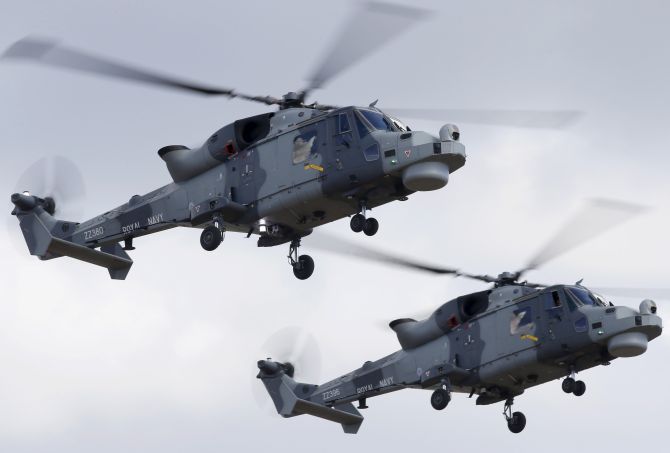
Whether it was the Bofors gun in 1986 or Italian helicopters in 2012, a leak or disclosure at the source overseas is like dynamite, and usually impossible to refute.
They acquire a life of their own in the hands of the media, says T N Ninan.
The thesis that it is simpler, cheaper, more efficient and ultimately safer to finance political funding through offshore deals, and to park the money abroad, has been attributed rightly or wrongly to a long-dead member of the Gandhi family.
The core argument was that collecting money in India from Indian businessmen involved too many people, including intermediaries who would be tempted to take a cut; created messy quid pro quo obligations; and came with a high level of risk because of the leakiness of the Indian system.
Also, the sums involved were usually quite small, compared to what was available on large arms deals, civilian aircraft purchases and petroleum contracts -- all of which have been known globally to involve pay-offs, almost as a routine part of business.
Whatever the validity of this argument may have been in the early 1980s, it no longer holds good. Whether it was the Bofors gun in 1986 or Italian helicopters in 2012, a leak or disclosure at the source overseas is like dynamite, and usually impossible to refute.
Diary notings, scraps of paper, comments by investigators or judges in the foreign country -- they acquire a life of their own in the hands of the media.
Crucially, events overseas are out of the control of even the most powerful people in the country. It is a more feasible proposition to block or derail investigations by Indian agencies like the Central Bureau of Investigation, described by a court as a 'caged parrot,' and the more recently created National Investigation Agency which (it would seem) is willing to shoot in any direction you point it.
Why, even the downstream prosecutorial action required by overseas disclosures has been stymied here, more often than not.
Allegations of international pay-offs tend to have legs that are out of proportion to the sums involved. Bofors survived as a scandal long after Rajiv Gandhi, till it became clear who got the money and also that the recipients were beyond the reach of Indian law.
The helicopter pay-offs have been acknowledged as fact, what remains is to establish who got the money -- and the Bharatiya Janata Party has made it clear that it is going to play this for all it is worth.
Until the facts emerge, the Congress as the party in power at the time of the aborted deal will be on the back foot, politically.
It may be more difficult to flick this off one's shoulder, compared to (say) the involvement of Trinamool Congress leaders in West Bengal's Saradha scandal, which seems to have had little impact on the party's political fortunes although the scam involved sizeable losses to large numbers of voters.
The other material point is that the global attitude has changed with regard to banking secrecy and tax havens -- the big countries are coming down hard on these because they wish to crack down on tax evasion, and smaller countries are getting the benefit of the disclosures that have followed.
What is curious, though, is how the disclosures so far of secret bank accounts and fronted companies in tax havens have unearthed no political money and indeed no political connections.
Rather, the HSBC accounts in Geneva and the companies named in the Panama Papers have tended to be purely business-related operations, quite a bit of them legitimate. The sums involved are small too, usually a few million dollars.
Since it is no one's case that Indian political money has not been stashed away abroad, this raises interesting questions about where exactly political money is parked.
Finally, there is the sorry spectacle of a former air chief caught in the cross-hairs of the helicopter business. Media sting operations have made clear over the years that it is far from difficult to get into pay-off discussions with senior service officers, whose primary duty it is to defend the country.
The disastrous consequence is stymied defence equipment orders, and exposed defences.











